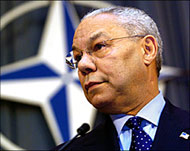US had it wrong: terrorism increasing
The US State Department has said an initial report claiming a decline in international “terrorist” attacks was based on erroneous data.

The figures have actually risen sharply, the revised report says.
The State Department also said on Thursday that the number of deaths was expected to be higher for 2003 than the 307 initially reported.
However, they do not believe it may exceed 2002’s 725 fatalities.
The admissions dented the claim by US President George Bush’s administration that Washington is winning the “war on terrorism”, an argument critical to his re-election strategy.
The State Department’s Patterns of Global Terrorism Report released on 29 April had initially claimed “terrorist” attacks fell to 190 last year, their lowest since 1969, from 198 in 2002.
It also said those killed dropped to 307, including 35 US citizens, from 725 in 2002, including 27 Americans.
Errors in data
State Department spokesman Richard Boucher said both totals were understated because of errors in compiling the data by the Terrorist Threat Integration Centre. The inter-agency group was set up last year to address the failure of US intelligence agencies to prevent the 11 September attacks.
|
“I am very disturbed that there were errors in the report. We’re going to correct it” Colin Powell, |
Boucher said terrorism experts appeared to have made a series of mistakes, failing to count attacks for the full year and possibly misinterpreting the definition of such attacks to exclude incidents included in the past.
“The data in the report are incomplete and in some cases incorrect,” he said, admitting his department failed to catch the mistakes. “We got the wrong data and we didn’t check it
enough … That’s the simplest explanation for what happened.”
US Secretary of State Colin Powell said he was “very disturbed” that errors had made it into the report but denied the numbers were manipulated for political benefit.
Dampening spirits
When the report was released, Deputy Secretary of State Richard Armitage said it provided “clear evidence that we are prevailing in the fight” while State Department coordinator for
counterterrorism Cofer Black hailed its “good news.”
Boucher said the department learned of the report’s errors in the first week of May and began an investigation. He said a letter dated 17 May from Representative Henry Waxman, a California Democrat and frequent critic of the administration, spurred its efforts.
 |
|
The State Department didn’t |
The State Department did not publicly acknowledge the report’s errors until they were reported in the media.
Boucher said the State Department asked the Terrorist Threat Integration Centre to review the numbers and would publish revised figures when they were available.
He initially said preliminary indications were that the correct data would show “a sharp increase over the previous year” in both incidents and deaths, but he later said he was
not sure if the number of deaths would exceed 2002’s level.
‘Wait and see’
“I don’t know. We’ll have to wait and see the numbers,” Boucher later said. “As far as comparison with previous years, we’ll have to wait and see what the final numbers are.”
One US official who asked not to be named said the report’s errors included a failure to count “international terrorist attacks” that occurred after 11 November, 2003.
“I am very disturbed that there were errors in the report,” Powell told reporters. “We’re going to correct it.”
Asked if the numbers were manipulated to make the administration look good, Powell said: “Of course not.”
“Nobody has suggested that the war on terrorism has been won. Quite the contrary, the president has made it clear that it is a war that continues and that we have to redouble our
efforts,” he later added.